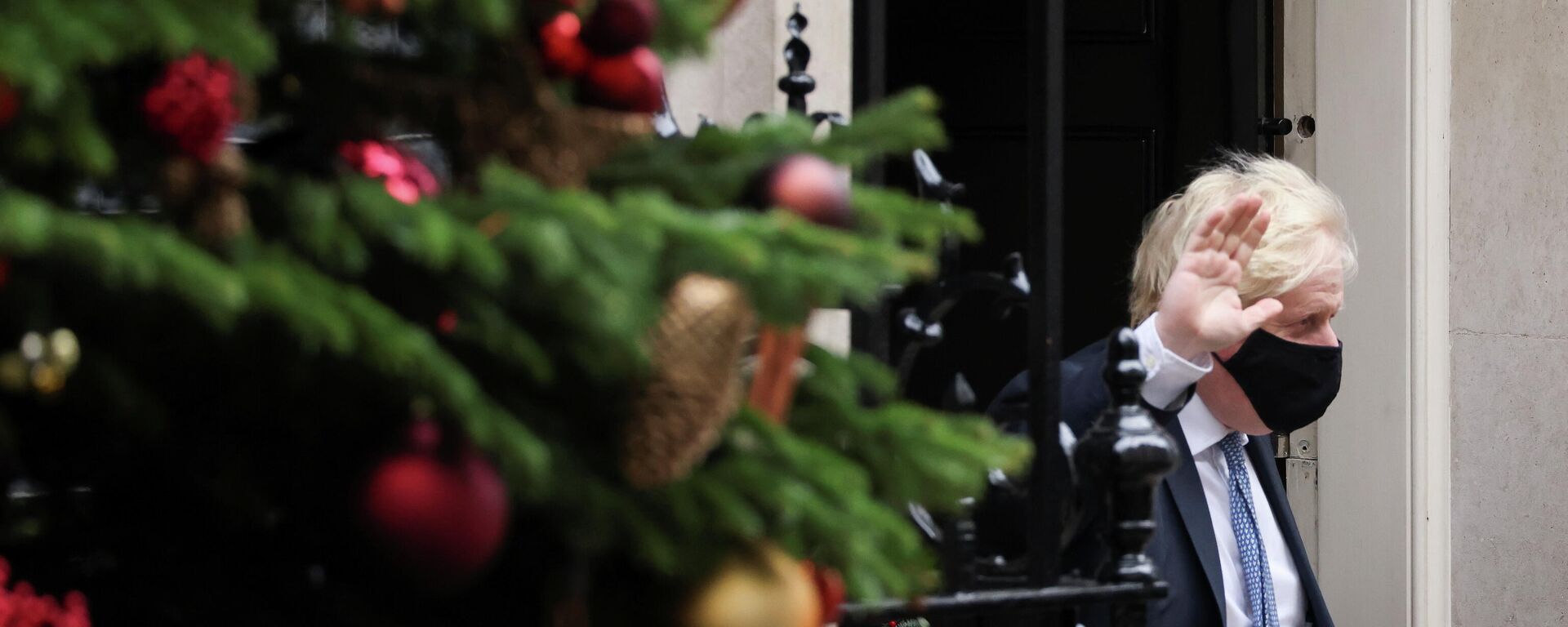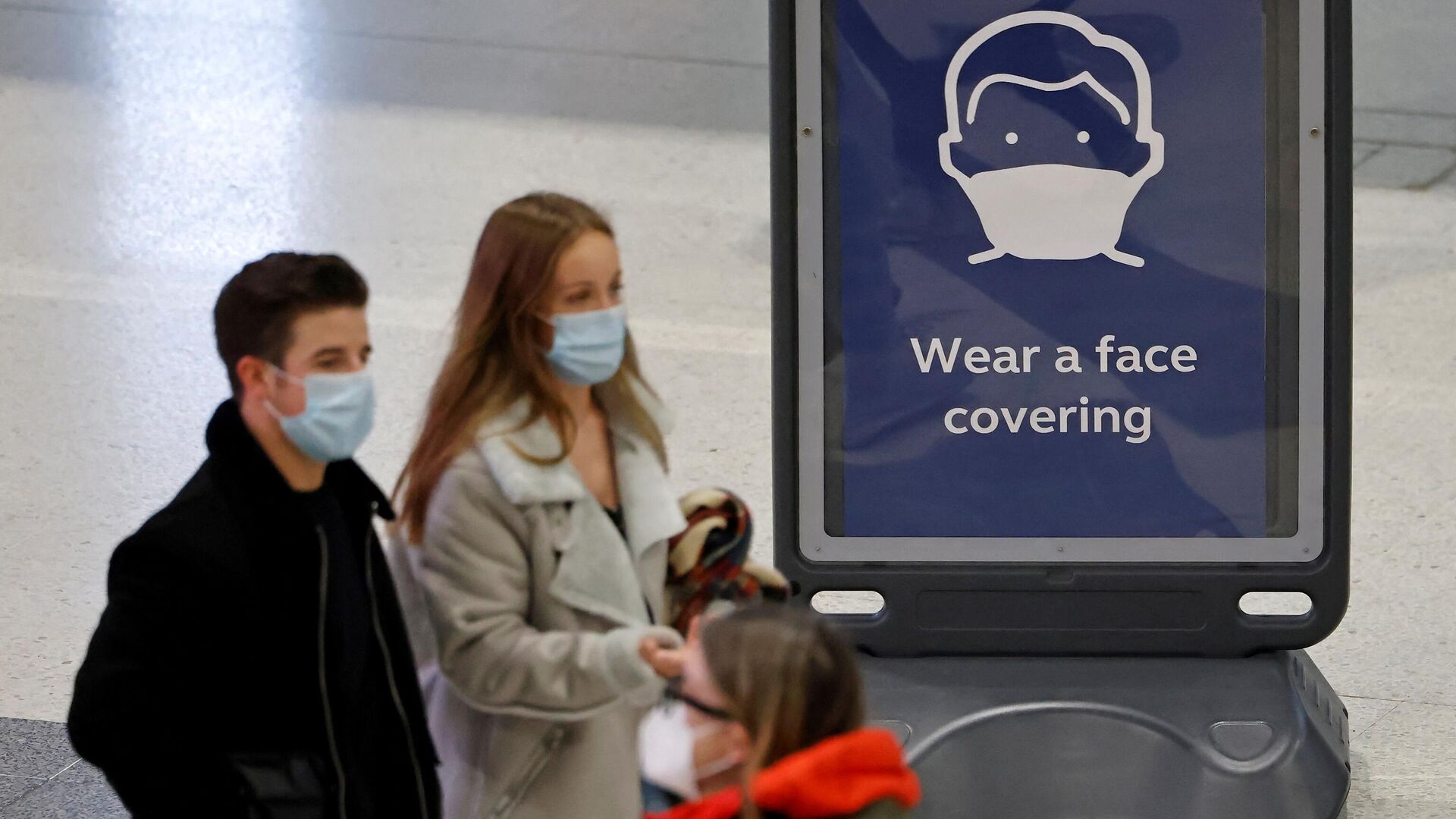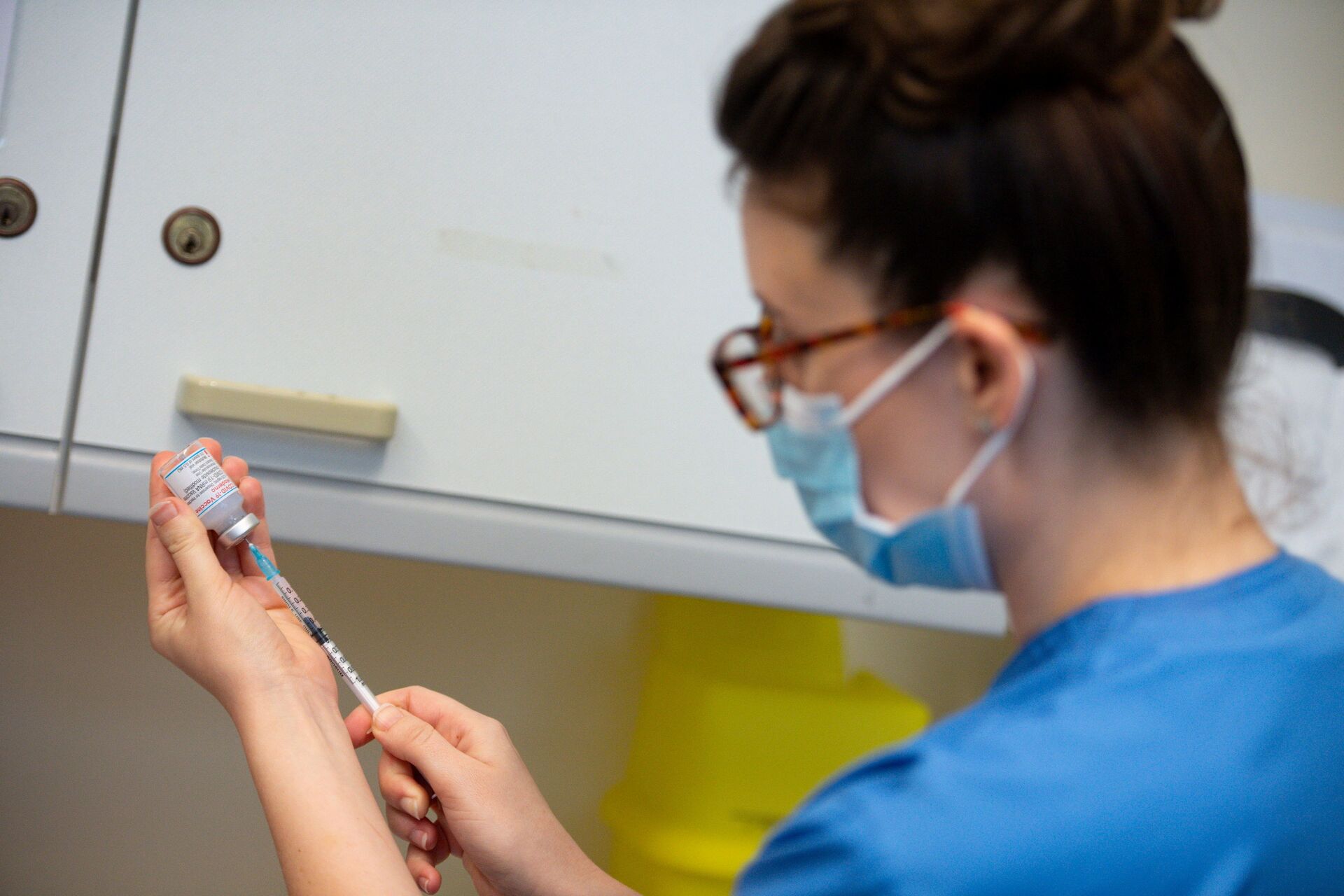https://sputnikglobe.com/20211226/wales-scotland-ni-close-nightclubs-limit-indoor-gatherings-as-part-of-new-covid-19-restrictions-1091811193.html
Wales, Scotland, NI Close Nightclubs, Limit Indoor Gatherings as Part of New COVID-19 Restrictions
Wales, Scotland, NI Close Nightclubs, Limit Indoor Gatherings as Part of New COVID-19 Restrictions
Sputnik International
New restrictions are coming into force on Boxing Day in Wales, Scotland and Northern Ireland for three weeks in a bid to curb soaring COVID-19 cases.
2021-12-26T11:20+0000
2021-12-26T11:20+0000
2023-05-28T15:17+0000
northern ireland
wales
scotland
covid-19
omicron strain
boris johnson
united kingdom (uk)
https://cdn1.img.sputnikglobe.com/img/07e5/0c/13/1091642865_0:0:3070:1728_1920x0_80_0_0_60b120e37f1676975e8f2309e76a6e6d.jpg
New restrictions are coming into force on Boxing Day (26 December) in Wales, Scotland and Northern Ireland for three weeks in a bid to curb soaring COVID-19 cases. Here are the details of the reintroduced measures.Wales In Wales, where all limits on indoor or outdoor event attendance had been lifted on 7 August with the introduction of COVID-19 alert level zero, restrictions are now being reintroduced as the new Omicron variant spreads across the UK. Nightclubs are to close in accordance with the rules, while a maximum of six people will be allowed to meet in pubs, cinemas and restaurants.Furthermore, licensed premises will have to offer table service only, with face masks worn and contact tracing details collected. A total of 30 people will be allowed at indoor events, while 50 people will be allowed at outdoor events according to rules that took effect from 6am on 26 December. Two-metre social distancing is being required in all public premises and offices as part of the attempt to clamp down on the spread of the respiratory disease and, particularly, its highly-transmissible Omicron strain. While gyms, swimming pools, leisure centres, community centres and fitness facilities are to remain open, to offer additional protection, measures such as one-way systems and barriers will be resorted to. Fans will not be admitted to all sporting events in Wales from 26 December. The Welsh government recommended that people take lateral flow tests before socializing or shopping. As for schools, pupils are set to return later than planned for the start of the new spring term in January, with no clarity yet as to whether schools will close with classes taught online. Scotland The one-metre social distancing rule will apply to hospitality and leisure settings in Scotland from 27 December, with attendance at venues limited to 100 people standing indoors, 200 people seated indoors and 500 people outdoors. Accordingly, large Hogmanay, or New Year events, such as the celebrations in Edinburgh, are cancelled. Nightclubs in Scotland are to close for at least three weeks from 27 December, with the rules to be reviewed on 11 January. Deputy First Minister John Swinney said that a new law had required nightclubs to close rather than have them attempt to enforce the one-metre social distancing between customers. Funding has been promised to support affected businesses. Table service is now needed wherever alcohol is being served, with indoor venues required to collect contact details of customers to help with Test and Protect. Up to three households can meet in line with the guidelines. Businesses are required to take steps such as physical distancing and screens to curb the spread of the coronavirus, with employers legally required to enable their staff to work from home if possible. The Scottish government is urging people to limit socialising and take a lateral flow test before mixing with others. Adults and children aged 12 and over are to wear face coverings in indoor settings, such as shops, hospitality venues and public transport, with the recommendation that masks also be worn in outdoor crowded areas, like Christmas markets. All sporting events, such as football matches, will be spectator-free while the measures are in place. In line with the vaccine passport scheme introduced in October, anyone over the age of 18 must show proof - if asked - that they have had both doses of the vaccine before admitted to adult entertainment venues, unseated indoor live events with more than 500, unseated outdoor live events for more than 4,000 people and any event attended by more than 10,000 people.The two-metre distancing rule applies to healthcare settings such as hospitals, doctors' surgeries and dentists. Northern Ireland Nightclubs will be shut down in Northern Ireland, where the Omicron strain of the coronavirus now accounts for about 60% of all cases. As of 6am on 27 December, pubs, cafes and restaurants will have to provide table service only. All indoor standing events and dancing in hospitality settings will be banned. From 27 December a limit of six people - or 10 people from a single household - will be allowed in indoor hospitality settings. It will be "strongly recommended" that household mixing should be reduced to a maximum of three households. Businesses are being urged to implement "reasonable measures" to ensure two-metre social distancing. Where it is possible, working from home is "strongly" advised. Proof of COVID-19 vaccination status or a negative lateral flow test will remain a requirement when entering hospitality venues and some other indoor settings in line with a scheme set in place on 13 December. England The developments come as in England Downing Street has not ruled out the possibility that ministers could discuss further COVID restrictions on Monday. “Plan B” is currently in place after Boris Jonson managed to vote the measure in on 14 December despite strong Tory rebellion. People are urged to work from home whenever possible, mandatory face coverings have been imposed on public transport, in shops and other indoor spaces. In addition, a COVID-19 pass confirming vaccination is now mandatory for visiting crowded places across the UK, with daily testing required for those who may have come into contact with carriers of the coronavirus. Despite the UK registering record daily COVID-19 cases for several days in succession, with 122,186 new infections on 24 December, the Prime Minister is reluctant to opt for further restrictions. In his video address ahead of Christmas, Johnson said ministers "can't rule out" any further measures after 25 December, with Omicron swiftly spreading across the nation. The government acknowledged the situation was finely balanced and said it will continue to monitor the data closely and will not hesitate to act if the data justified it.
https://sputnikglobe.com/20211209/bojo-faces-tory-pressure-over-alleged-illicit-no-10-christmas-bash-plan-b-covid-restrictions-1091369831.html
northern ireland
wales
scotland
united kingdom (uk)
Sputnik International
feedback@sputniknews.com
+74956456601
MIA „Rossiya Segodnya“
2021
News
en_EN
Sputnik International
feedback@sputniknews.com
+74956456601
MIA „Rossiya Segodnya“
Sputnik International
feedback@sputniknews.com
+74956456601
MIA „Rossiya Segodnya“
wales northern oreland scotland covid-19 boris johnson
wales northern oreland scotland covid-19 boris johnson
Wales, Scotland, NI Close Nightclubs, Limit Indoor Gatherings as Part of New COVID-19 Restrictions
11:20 GMT 26.12.2021 (Updated: 15:17 GMT 28.05.2023) UK Prime Minister Boris Johnson has held off on introducing stricter coronavirus restrictions in England that his current “Plan B’, saying before Christmas that data was being closely being monitored and that his government would not hesitate to act after the holidays if further moves were justified.
New restrictions are coming into force on Boxing Day (26 December) in Wales, Scotland and Northern Ireland for three weeks in a bid to curb
soaring COVID-19 cases. Here are the details of the reintroduced measures.
In Wales, where all limits on indoor or outdoor event attendance had been lifted on 7 August with the introduction of COVID-19 alert level zero, restrictions are now being reintroduced as the new Omicron variant spreads across the UK. Nightclubs are to close in accordance with the rules, while a maximum of six people will be allowed to meet in pubs, cinemas and restaurants.
Furthermore, licensed premises will have to offer table service only, with face masks worn and contact tracing details collected. A total of 30 people will be allowed at indoor events, while 50 people will be allowed at outdoor events according to rules that took effect from 6am on 26 December.
Two-metre social distancing is being required in all public premises and offices as part of the attempt to clamp down on the spread of the respiratory disease and, particularly, its highly-transmissible Omicron strain. While gyms, swimming pools, leisure centres, community centres and fitness facilities are to remain open, to offer additional protection, measures such as one-way systems and barriers will be resorted to. Fans will not be admitted to all sporting events in Wales from 26 December.
The Welsh government recommended that people take lateral flow tests before socializing or shopping. As for schools, pupils are set to return later than planned for the start of the new spring term in January, with no clarity yet as to whether schools will close with classes taught online.
The one-metre social distancing rule will apply to hospitality and leisure settings in Scotland from 27 December, with attendance at venues limited to 100 people standing indoors, 200 people seated indoors and 500 people outdoors. Accordingly, large Hogmanay, or New Year events, such as the celebrations in Edinburgh, are cancelled.
Nightclubs in Scotland are
to close for at least three weeks from 27 December, with the rules to be reviewed on 11 January. Deputy First Minister John Swinney said that a new law had required nightclubs to close rather than have them attempt to enforce the one-metre social distancing between customers. Funding has been promised to support affected businesses. Table service is now needed wherever alcohol is being served, with indoor venues required to collect contact details of customers to help with Test and Protect.
Up to three households can meet in line with the guidelines. Businesses are required to take steps such as physical distancing and screens to curb the spread of the coronavirus, with employers legally required to enable their staff to work from home if possible.
The Scottish government is urging people to limit socialising and take a lateral flow test before mixing with others. Adults and children aged 12 and over are to wear face coverings in indoor settings, such as shops, hospitality venues and public transport, with the recommendation that masks also be worn in outdoor crowded areas, like Christmas markets.
All sporting events, such as football matches, will be spectator-free while the measures are in place. In line with the vaccine passport scheme introduced in October, anyone over the age of 18 must show proof - if asked - that they have had both doses of the vaccine before admitted to adult entertainment venues, unseated indoor live events with more than 500, unseated outdoor live events for more than 4,000 people and any event attended by more than 10,000 people.
The two-metre distancing rule applies to healthcare settings such as hospitals, doctors' surgeries and dentists.
Nightclubs will be shut down in Northern Ireland, where the Omicron strain of the coronavirus now accounts for about 60% of all cases. As of 6am on 27 December, pubs, cafes and restaurants will have to provide table service only. All indoor standing events and dancing in hospitality settings will be banned.
From 27 December a limit of six people - or 10 people from a single household - will be allowed in indoor hospitality settings. It will be "strongly recommended" that household mixing should be reduced to a maximum of three households. Businesses are being urged to implement "reasonable measures" to ensure two-metre social distancing. Where it is possible, working from home is "strongly" advised.
Proof of COVID-19 vaccination status or a negative lateral flow test will remain a requirement when entering hospitality venues and some other indoor settings in line with a scheme set in place on 13 December.
The developments come as in England Downing Street has not ruled out the possibility that ministers could discuss further COVID restrictions on Monday.
“Plan B” is currently in place after Boris Jonson managed to vote the measure in on 14 December despite strong Tory rebellion. People are urged to work from home whenever possible, mandatory face coverings have been imposed on public transport, in shops and other indoor spaces.

9 December 2021, 05:42 GMT
In addition, a COVID-19 pass confirming vaccination is now mandatory for visiting crowded places across the UK, with daily testing required for those who may have come into contact with carriers of the coronavirus.
Despite the UK registering record daily COVID-19 cases for several days in succession, with 122,186 new infections on 24 December, the Prime Minister is reluctant to opt for further restrictions.
In his video address ahead of Christmas, Johnson said ministers "can't rule out" any further measures after 25 December, with Omicron swiftly spreading across the nation. The government acknowledged the situation was finely balanced and said it will continue to monitor the data closely and will not hesitate to act if the data justified it.



